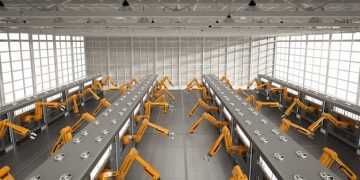US Job Market in 2025: High-Demand Industries & Opportunities

Understanding the US Job Market in 2025 reveals a shifting landscape, spotlighting booming sectors like healthcare, technology, and renewable energy, alongside promising career avenues for job seekers.
The understanding the US Job Market in 2025: High-Demand Industries and Career Opportunities is crucial for anyone planning their career path, seeking a job change, or simply wanting to stay informed about the economic landscape. The future of work is constantly evolving, and being aware of the trends can give you a competitive edge.
Navigating the US Job Market in 2025: An Overview
The US job market is dynamic, influenced by technological advancements, demographic shifts, and economic factors. Preparing for 2025 requires understanding these forces and identifying the industries and roles that will be in high demand.
Let’s delve into the key aspects that will shape the employment landscape in the coming years and how individuals can position themselves for success.
The Impact of Technology on Job Growth
Technology continues to be a major driver of job creation. Automation, artificial intelligence, and data analytics are transforming industries and creating new roles that require specialized skills.
Demographic Shifts and Labor Force Participation
Changes in the age and ethnic composition of the US population are also impacting the job market. Understanding labor force participation rates and the skills gap is crucial for addressing workforce challenges.
- Technological advancements creating new job categories.
- Aging population increasing demand for healthcare services.
- Globalization affecting trade and international business.
Looking ahead to 2025, it’s important to be aware of the intersection between technology, demographic shifts, and economic trends to effectively navigate the job market.

Healthcare: A Sector of Unyielding Demand
The healthcare industry is poised for significant growth, driven by an aging population and increasing demand for medical services. This sector offers a wide range of career opportunities, from direct patient care to administrative and technological roles.
Understanding the specific areas of growth within healthcare will help individuals identify promising career paths.
Nursing and Allied Health Professionals
Registered nurses, medical assistants, and physical therapists are among the most in-demand healthcare professionals. These roles require specialized training and certification but offer job security and competitive salaries.
Healthcare Technology and Informatics
The adoption of electronic health records and telemedicine is creating new opportunities for healthcare technology professionals. Expertise in data analytics, cybersecurity, and software development is highly valued in this sector.
- Growth in home healthcare services for seniors.
- Increased demand for mental health professionals.
- Expansion of telemedicine and remote patient monitoring.
The healthcare industry is not only a source of employment but also a critical component of society, offering rewarding careers that make a difference in people’s lives.
Technology: The Engine of Innovation and Job Creation
The technology sector continues to be a powerhouse, driving innovation and creating high-paying jobs. From software development to data science, the demand for tech professionals is expected to remain strong in 2025 and beyond.
Staying updated with the latest technological trends and acquiring relevant skills is essential for success in this dynamic industry.
Software Development and Engineering
Software developers, engineers, and architects are highly sought after by companies across various industries. Proficiency in programming languages, cloud computing, and DevOps practices is essential for these roles.
Data Science and Analytics
The explosion of data is creating a need for data scientists and analysts who can extract insights and drive business decisions. Expertise in statistical analysis, machine learning, and data visualization is highly valued.
- Growth in artificial intelligence and machine learning.
- Increased demand for cybersecurity professionals.
- Expansion of cloud computing and edge computing.
The technology sector offers unparalleled opportunities for innovation and career growth, attracting talent from diverse backgrounds and disciplines.

Renewable Energy: Powering a Sustainable Future
The renewable energy sector is experiencing rapid growth, driven by concerns about climate change and a growing demand for clean energy sources. This sector offers opportunities in engineering, installation, maintenance, and policy.
Investing in renewable energy technologies and promoting sustainable practices is not only environmentally responsible but also economically beneficial, creating jobs and stimulating innovation.
Solar and Wind Energy Technicians
Solar panel installers and wind turbine technicians are in high demand as renewable energy projects expand across the country. These roles require technical skills and a commitment to safety.
Environmental Engineers and Scientists
Environmental engineers and scientists play a crucial role in developing sustainable energy solutions and mitigating the environmental impact of energy production. Expertise in renewable energy technologies, waste management, and environmental regulations is highly valued.
- Government incentives and policies supporting renewable energy.
- Falling costs of solar and wind energy technologies.
- Growing awareness of climate change and the need for sustainable solutions.
The renewable energy sector is at the forefront of the transition to a cleaner, more sustainable economy, offering fulfilling careers that contribute to a better future.
Manufacturing and Logistics: Adapting to Automation and Globalization
The manufacturing and logistics sectors are undergoing significant changes due to automation, globalization, and shifts in consumer demand. Companies are investing in new technologies and processes to improve efficiency and competitiveness.
Understanding these trends and acquiring relevant skills is essential for workers in these sectors to adapt and thrive in the changing job market.
Robotics Technicians and Automation Specialists
Robotics technicians and automation specialists are in high demand as companies implement automated systems in their manufacturing and logistics operations. These roles require expertise in robotics, programming, and control systems.
Supply Chain and Logistics Managers
Supply chain and logistics managers play a critical role in ensuring the efficient flow of goods and materials. Expertise in supply chain management, logistics software, and international trade is highly valued.
- Growth in e-commerce and online retail.
- Adoption of advanced manufacturing technologies.
- Increased emphasis on supply chain resilience and sustainability.
The manufacturing and logistics sectors are evolving rapidly, offering opportunities for skilled workers who can adapt to new technologies and processes.
Financial Services: Adapting to Digital Transformation
The financial services industry is undergoing a digital transformation, driven by fintech innovations and changing customer expectations. Companies are investing in new technologies and services to improve efficiency and customer experience.
Staying updated with the latest trends in fintech and acquiring relevant skills is essential for professionals in the financial services industry.
Financial Analysts and Advisors
Financial analysts and advisors play a critical role in helping individuals and businesses make informed financial decisions. Expertise in financial planning, investment management, and risk assessment is highly valued.
Data and cyber security analysts
With the increasing reliance on digital systems, cybersecurity professionals are essential in protecting financial data and systems from cyber threats. Expertise in cybersecurity, risk management, and compliance is in high demand.
- Growth in fintech and digital banking services.
- Increased regulation of financial institutions.
- Globalization of financial markets.
The financial services industry offers opportunities for professionals who can navigate the complexities of the digital age and provide value to clients and businesses.
Education: Preparing the Workforce of the Future
The education sector plays a critical role in preparing the workforce of the future, equipping individuals with the skills and knowledge they need to succeed in the 21st-century economy. This sector includes teachers, trainers, and educational administrators.
Investing in education and training programs is essential for addressing the skills gap and ensuring that individuals have the opportunities they need to thrive.
Teachers and Educators
Teachers and educators are in demand at all levels, from early childhood education to higher education. Expertise in instructional design, curriculum development, and student assessment is highly valued.
Corporate Trainers and Development Specialists
Corporate trainers and development specialists play a crucial role in helping companies train their employees and improve their performance. Expertise in training methodologies, learning technologies, and employee development is highly valued.
- Growing emphasis on STEM education.
- Increased demand for online and remote learning opportunities.
- Focus on skills-based education and workforce development.
The education sector is essential for building a skilled and competitive workforce, offering opportunities for professionals who are passionate about teaching and learning.
| Key Point | Brief Description |
|---|---|
| 📈 Healthcare Growth | Aging population fuels demand for healthcare jobs. |
| 💻 Tech Dominance | Software, data science, and cybersecurity roles are booming. |
| ⚡ Renewable Energy | Solar and wind energy jobs are increasing rapidly. |
| 🏭 Manufacturing Evolution | Automation requires skilled robotics technicians. |
Frequently Asked Questions
▼
Healthcare, technology, and renewable energy are projected to be the top three high-demand industries in 2025, driven by demographic shifts, technological advancements, and environmental concerns.
▼
Proficiency in artificial intelligence, machine learning, cybersecurity, and cloud computing will be highly valuable in the tech sector in 2025. These skills are essential for driving innovation.
▼
Automation is transforming industries and creating new job categories, particularly in areas like robotics, data analytics, and software development. This necessitates continuous upskilling and reskilling.
▼
Education is crucial for equipping individuals with the skills and knowledge they need to succeed in the 21st-century economy. STEM education, online learning and workforce development programs are vital.
▼
Yes, there are opportunities in fintech, financial analysis, and cybersecurity within the financial services sector. These areas are growing due to digital transformation and increased regulatory requirements.
Conclusion
Understanding the US Job Market in 2025: High-Demand Industries and Career Opportunities presented here offers a roadmap for navigating the evolving employment landscape. By staying informed, acquiring relevant skills, and adapting to change, individuals can position themselves for success in the years to come.






